A TSW Thanksgiving Tradition: Squanto, The Pilgrims, and the Pope
 On the day before Thanksgiving every year since 1961, The Wall Street Journal publishes the same two lead editorials by Vermont C. Royster. "The Desolate Wilderness” describes the challenges of the Puritan Pilgrims of the Mayflower who left such a deeply engraved mark - for better or worse - on the spirit of America. "And the Fair Land" lays out the free market foundation upon which American enterprise was built. These editorials are now Thanksgiving classics, and well worth a visit to The Wall Street Journal.These Stone Walls has a Thanksgiving classic of its own. It has been said that history is written by the victors, and, as such, what we have learned in history class growing up was often not the whole story. The classic account of the first Thanksgiving in America has been widely told from the point of view of the Pilgrims who landed at what is now Plymouth, Massachusetts in 1620. What if it were told from the point of view of Squanto, the Native American guide without whom the story of Thanksgiving might have been very different?This is the little known story of Squanto, and of how he saved the day for the pilgrims and strangers in this strange land who ventured here to be forever rid of the remnants of Catholicism in the Church of England. It's a story of how Catholic respect for human life reached across entire oceans and continents to save a man's life so he could in turn save others. It's a story of the triumph of grace and the twists and turns of a human soul venturing toward God.And if the Pilgrims knew a Pope was involved, they might just have climbed back aboard the Mayflower. This is an account of Thanksgiving we hope you will want to pass along to others, and include in your own Thanksgiving celebration.Click here to read "The True Story of Thanksgiving: Squanto, the Pilgrims, and the Pope."
On the day before Thanksgiving every year since 1961, The Wall Street Journal publishes the same two lead editorials by Vermont C. Royster. "The Desolate Wilderness” describes the challenges of the Puritan Pilgrims of the Mayflower who left such a deeply engraved mark - for better or worse - on the spirit of America. "And the Fair Land" lays out the free market foundation upon which American enterprise was built. These editorials are now Thanksgiving classics, and well worth a visit to The Wall Street Journal.These Stone Walls has a Thanksgiving classic of its own. It has been said that history is written by the victors, and, as such, what we have learned in history class growing up was often not the whole story. The classic account of the first Thanksgiving in America has been widely told from the point of view of the Pilgrims who landed at what is now Plymouth, Massachusetts in 1620. What if it were told from the point of view of Squanto, the Native American guide without whom the story of Thanksgiving might have been very different?This is the little known story of Squanto, and of how he saved the day for the pilgrims and strangers in this strange land who ventured here to be forever rid of the remnants of Catholicism in the Church of England. It's a story of how Catholic respect for human life reached across entire oceans and continents to save a man's life so he could in turn save others. It's a story of the triumph of grace and the twists and turns of a human soul venturing toward God.And if the Pilgrims knew a Pope was involved, they might just have climbed back aboard the Mayflower. This is an account of Thanksgiving we hope you will want to pass along to others, and include in your own Thanksgiving celebration.Click here to read "The True Story of Thanksgiving: Squanto, the Pilgrims, and the Pope."
